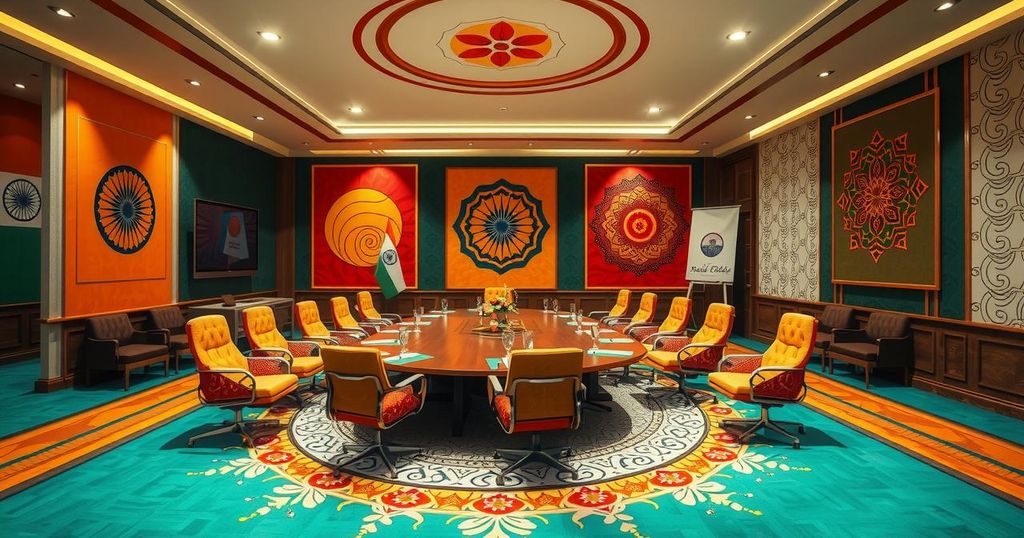Prime Minister Modi praised multi-party delegations that represented India in 33 countries, emphasizing the importance of presenting a unified stance against terrorism. The delegations provided feedback on their visits and Modi encouraged further diplomatic initiatives to amplify India’s voice globally. Leaders from across political lines discussed the significance of India’s position on terrorism in light of recent events, while Modi shared insights regarding international relations.
On May 17, the Indian government put forth an interesting initiative, announcing that lawmakers from various political parties would form seven delegations. Their task? To be the face of India’s stance on cross-border terrorism and the recent Operation Sindoor. Prime Minister Narendra Modi met with these delegations recently, impressed by their efforts in presenting a unified Indian voice across 33 countries in just two weeks.
Modi expressed pride in how the delegations represented India’s positions, stressing that it’s crucial to continue using such platforms. According to those familiar with the meeting, he underscored that these initiatives convey India’s solidarity against terrorism. “Met members of the various delegations who represented India in different countries…we are all proud of the manner in which they put forward India’s voice,” Modi mentioned on social media.
During the meeting, which took place at the Prime Minister’s official residence, delegates discussed their experiences and shared feedback on their interactions. They reported back on engagements with international leaders about India’s commitment to peace and anti-terrorism measures. Modi listened intently, allowing for an informal atmosphere where ideas could flow freely.
This recent push for diplomatic outreach follows the attack in Pahalgam on April 22. Lawmakers were clear in their intention to address concerns regarding terrorism. “We are all grateful for the opportunity to be of service to the nation,” commented Congress leader Shashi Tharoor, who headed the delegation to various nations including the USA and Brazil.
Most of the seven delegations were led by members of the ruling National Democratic Alliance, while the remainder were spearheaded by opposition leaders. Modi took a moment to commend all delegates for their commendable work, acknowledging that some were surprised by the collaboration between political rivals, which indeed piqued interest abroad.
Digesting feedback from these meetings, Modi learned about global leaders’ sentiments towards India’s new diplomatic strategies. The larger theme, as discussed by the delegations, was that India would not tolerate acts of terrorism and was committed to addressing these issues head-on. Certain international conversations reflected the alignment with India’s stance that all terror acts will be met with resolute responses.
Shiv Sena member Shrikant Shinde remarked on the positive reception India garnered for its anti-terror policies during his delegation’s visits to countries across Africa and the Middle East. He highlighted that many foreign nations expressed their unwavering support for India’s stance against terrorism, noting strong diplomatic ties.
Some members highlighted Modi’s rapport with several world leaders—especially in Saudi Arabia—as a factor that led to affirmative responses toward India’s initiatives. Modi emphasized encouraging these kinds of delegations in the future to improve India’s global image through soft diplomacy.
In an insightful reflection, Modi recounted how concerns about India’s investment landscape amidst regional unrest must be addressed. He shared a memory from 2012, reflecting on curiosity he encountered during his visit to Japan regarding violence in manufacturing sectors back in India.
The meeting had several noteworthy attendees including BJP’s Ravi Shankar Prasad and Tharoor from Congress alongside other parliamentary leaders from various parties. Ravi Shankar Prasad also held a press conference, sharing insights about his delegation’s efforts to communicate evidence showcasing Pakistan’s ties to terrorism. He clarified that India’s stance is against the actions of Pakistan’s military rather than its citizens—an enduring effort from India to maintain reconciliatory ties despite past tensions.
With this diplomatic outreach, Modi is attempting to not just promote India’s message but also to strengthen relationships with international partners, promoting peace and a collective fight against terrorism.
The recent meeting between Prime Minister Modi and the multi-party delegations underlined India’s strong, united stand against terrorism, showcasing a collaborative approach that span across political parties. This step seems aimed at amplifying India’s voice on the global stage. Modi’s emphasis on soft diplomacy and continued engagement with international counterparts hints at a commitment to address both terrorism and the concerns regarding India’s image as an investment destination. The participation of various political factions reflects a rare, possibly powerful national consensus on key issues.
Original Source: www.hindustantimes.com






